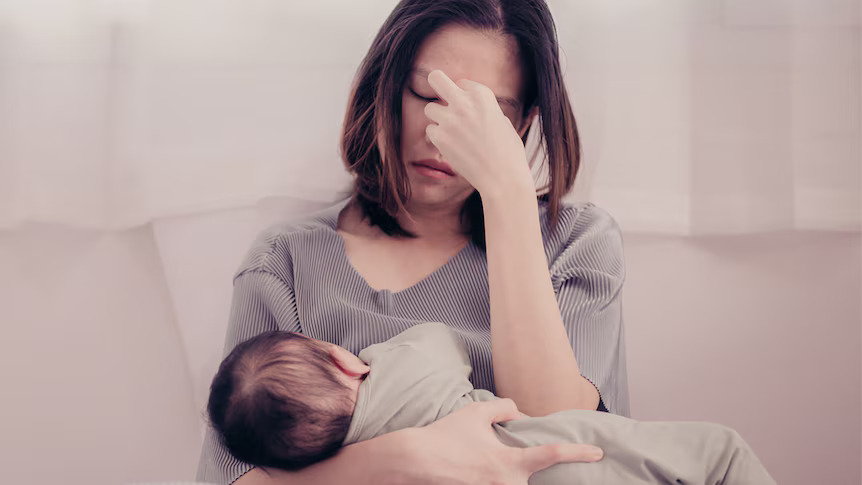Having a baby is a very emotional experience. There are three causes of low mood after childbirth:
- Postnatal (puerperal) psychosis. This is an uncommon but severe form of mental illness. It is so severe that it requires hospital admission and in-patient care.
- Baby blues. It is very common and almost considered normal to have these. Symptoms include being weepy, irritability, anxiety, and feeling low. They do not usually need any medical treatment.
- Postnatal depression (PND). This occurs in about 1 in 10 mothers. Symptoms, including low mood, last for much longer than with baby blues. Treatment is advised.
Signs and symptoms:
The symptoms are similar to those that occur with depression at any other time. They usually include one or more of the following. In PND, symptoms are usually there on most days, for most of the time, for two weeks or more.
- Low mood tends to be worse first thing in the morning.
- Not enjoying anything. Lack of interest in yourself and your baby.
- Lack of motivation to do anything.
- Often feeling tearful.
- Feeling irritable a lot of the time.
- Feelings of guilt, rejection, or not being good enough.
- Forgetting or losing things or being unable to make a decision about things.
- Feeling unable to cope with anything.
When to see a doctor?
Sometimes, self-help measures are not enough. If symptoms persist for more than two weeks, you should consider seeking professional support. Or, if the way you feel is interfering with the way you are used to functioning, you will feel better if you let your doctor know. More often than not, a combination of therapy and antidepressant medication is the most effective treatment for postnatal depression and anxiety.
بعد از پیدائش ڈپریشن۔
بچہ پیدا کرنا بہت ہی جذباتی تجربہ ہے۔ بچے کی پیدائش کے بعد ڈپریشن کی تین وجوہات ہیں
- بے بی بلیوز۔ یہ ہونا بہت عام اور تقریبا نارمل سمجھا جاتا ہے۔ علامات میں رونا ، چڑچڑاپن ، اضطراب اور احساس کمتری شامل ہیں۔ انہیں عام طور پر کسی طبی علاج کی ضرورت نہیں ہوتی۔
- بعد از پیدائش ڈپریشن (PND- Post-Natal Depression)۔ یہ 10 میں سے 1 ماؤں میں ہوتا ہے۔ علامات ، بشمول مزاج کی خرابی ، بے بی بلیوز کے مقابلے میں زیادہ دیر تک رہتی ہیں۔ علاج کا مشورہ دیا جاتا ہے۔
- بعد از پیدائش نفسیاتی ہو جانا (psychosis) ۔ یہ ذہنی بیماری کی ایک غیر معمولی اور شدید شکل ہے۔ یہ اتنا شدید ہے کہ اسے ہسپتال میں داخل کر کے مریض کی دیکھ بھال کی ضرورت ہوتی ہے۔
نشانات و علامات
بعد از پیدائش ڈپریشن کی علامات ان علامات سے ملتی جلتی ہیں جو کسی عام ڈپریشن کے ساتھ ہوتی ہیں۔ ان میں عام طور پر درج ذیل میں سے ایک یا زیادہ شامل ہوتے ہیں۔ PND میں ، علامات عام طور پر مہینے کے زیادہ تر دنوں میں پائی جاتی ہیں ،دن کے زیادہ تر اوقات میں ملتی ہیں، دو ہفتوں یا اس سے زیادہ کے لیے موجود رہتی پیں۔
- مزاج کی خرابی جو عام طور پر صبح کے اوقات سب سے پہلے طے
ظاہر ہوتی ہے۔
-کسی چیز سے لطف اندوز نہ ہونا۔ -اپنے آپ اور اپنے بچے میں دلچسپی کا فقدان۔
- کچھ بھی کرنے کی رغبت کا فقدان۔
- اکثر آنکھوں میں آنسو آ جانا ۔
- بہت زیادہ چڑچڑاپن محسوس کرنا۔
- چیزوں کو بھول جانا یا کھودینا یا چیزوں کے بارے میں فیصلہ کرنے سے قاصر ہونا۔
- کسی بھی چیز سے نمٹنے کے قابل محسوس نہ ہونا۔
ڈاکٹر سے کب ملنا ہے
بعض اوقات ، خود امدادی کے اقدامات کافی نہیں ہوتے ہیں۔ اگر علامات دو ہفتوں سے زیادہ رہیں تو آپ کو پیشہ ورانہ مدد لینے پر غور کرنا چاہیے۔ یا ، اگر آپ محسوس کرتے ہیں کہ یہ ڈپریشن آپ کے روزمرہ کے کاموں میں مداخلت کر رہا ہے ۔ اگر آپ اپنے ڈاکٹر کو بتائیں گے تو آپ بہتر محسوس کریں گے۔ اکثر اوقات ، تھراپی اور اینٹی ڈپریسنٹ ادویات کا مجموعہ بعد از پیدائش ڈپریشن اور اضطراب کا سب سے موثر علاج ہے۔
Doctors to consult (Clinical Psychologist, Gynecologist):
Dr. Rizwana Siddiqui Zahid, Dr. Nida Mehwish, Dr Shumaila Raza
Note: Click the Doctor's name to make an appointment.
Reference:
https://patient.info/mental-health/postnatal-depression-leaflet
https://www.mayoclinic.org/diseases-conditions/postpartum-depression/symptoms-causes/syc-20376617

